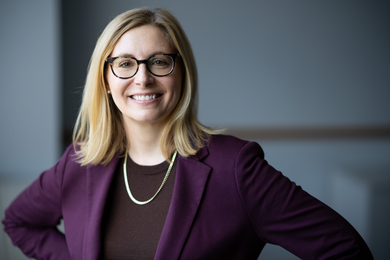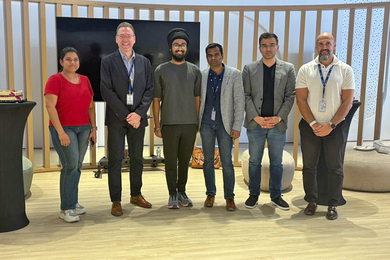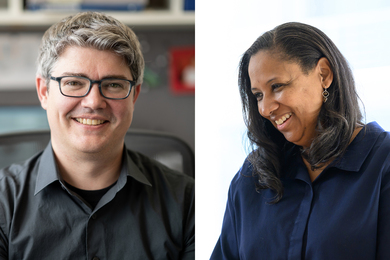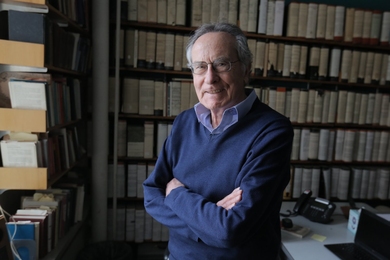Robert Bishop, a microeconomic theorist and innovative teacher who served as head of MIT’s Department of Economics and as dean of the School of Humanities, Arts, and Social Sciences, died on Thursday, Feb. 7, at his home in Cambridge. He was 96, and had been affiliated with MIT continuously since 1942.
“Bob was a terrific colleague and exceedingly sharp,” said Robert M. Solow, professor emeritus of economics at MIT, who first met Bishop in the 1940s. “He was a marvelous teacher, very precise, very careful, and very detailed.”
As a researcher, Bishop published papers on a range of topics, including game theory and public finance. As a teacher, he was known for, among other things, the “Bishop notes” — a detailed set of notes on course 14.121, a graduate-level introduction to microeconomic theory, which became an essential resource for PhD students over many years.
Whether in his research, teaching, or critiques of colleagues’ work, Solow said, Bishop “was a devotee of what is in many ways the MIT style, using as few bells and whistles as possible, deciding what the main point is,” and carefully homing in on that.
As an active presence in MIT economics from its early days as a little-noticed “service department” through its growth into a prominent department fully invested in teaching, research and the training of PhD students, Bishop played a key role in “that evolution of the powerhouse that the department has become,” said Richard Williams, one of Bishop’s nephews, who helped care for Bishop in recent years.
Robert Bishop was born in St. Louis on June 4, 1916, to Lyle A. Bishop and Helen Craden Bishop. The family soon moved to New York, where Bishop graduated from Manhasset High School on Long Island. He graduated summa cum laude from Harvard University in 1937. After a year in graduate school at Princeton University, the economist John Kenneth Galbraith urged Bishop to return to Harvard, where Bishop received an M.A. in economics. Bishop joined MIT’s economics department in 1942, and received his PhD from Harvard in 1949.
As a graduate student at Harvard, Bishop met his wife, Joan Fiss, who had already acquired an M.A. from Radcliffe College, in 1935, and a degree in business administration from Harvard, in 1938. After marrying, they moved to Wellesley, Mass., where Joan Bishop worked at Wellesley College; she died in 1981. Bishop lived in Wellesley for 59 years, until moving about six years ago to Cambridge.
Bishop’s first significant published article, in the Quarterly Journal of Economics (QJE) in 1943, examined the concept of “consumer’s surplus,” when consumers can buy products for less than their perceived full value. Some of Bishop’s additional research contributions include a pair of papers on bargaining theory — one published in the QJE in 1963, and one published in Econometrica the following year. He also published a 1968 paper in the QJE on the different effects of specific taxes (those based on the quantity of a good purchased) and ad valorem taxes (those based on value, such as property taxes).
Bishop was also co-editor, with Paul A. Samuelson and J.R. Coleman, of the volume “Readings in Economics,” first published in 1952.
Bishop served as head of MIT’s Department of Economics from 1958 until 1965, and was the second dean of the School of Humanities, Arts, and Social Sciences — then known as the School of Humanities and Social Science — from 1964 until 1973. He helped oversee the reorganization of the school at a time when it was expanding its programs. Bishop remained a professor at MIT until retiring in 1986; he was also a fellow of the American Academy of Arts and Sciences.
According to Solow, Bishop was highly sociable, friendly with colleagues, and generous in listening to his colleagues discuss their research, often offering useful thoughts about their work.
“He was very quick with pointed questions about what was important about it, and what was weakest,” Solow said. Bishop’s devotion to teaching, and to supporting his colleagues, “is part of what makes a department a department,” Solow added.
Bishop was an ardent fan of musical theater, and opera more specifically, with an encyclopedic knowledge of scores, lyrics, performers and productions. He would sometimes entertain friends with renditions of arias, and accumulated a substantial collection of annotated playbills from the shows he had seen.
“He could quote a song from Gilbert and Sullivan you’d never heard of,” Solow recalled. Bishop also loved telling stories about the history of opera and musical theater.
“He was a raconteur in his own way,” said Williams, his nephew. “Above all, he was a polymath. He knew a lot about a lot of things.”
Bishop is survived by his sister, Betty Williams of Indianapolis, and seven nieces and nephews: Helen Williams Hill of Santa Monica, Calif.; Roberton C. Williams of Alexandria, Va.; Richard Bishop Williams of Somerville, Mass.; David Lyle Williams of Zionsville, Ind.; Thomas H. Bishop of New York; Robert C. Bishop of Lexington, Mass.; and Katherine Bishop Kilmurray of Arlington, Mass. A memorial service is being planned for spring 2013.
“Bob was a terrific colleague and exceedingly sharp,” said Robert M. Solow, professor emeritus of economics at MIT, who first met Bishop in the 1940s. “He was a marvelous teacher, very precise, very careful, and very detailed.”
As a researcher, Bishop published papers on a range of topics, including game theory and public finance. As a teacher, he was known for, among other things, the “Bishop notes” — a detailed set of notes on course 14.121, a graduate-level introduction to microeconomic theory, which became an essential resource for PhD students over many years.
Whether in his research, teaching, or critiques of colleagues’ work, Solow said, Bishop “was a devotee of what is in many ways the MIT style, using as few bells and whistles as possible, deciding what the main point is,” and carefully homing in on that.
As an active presence in MIT economics from its early days as a little-noticed “service department” through its growth into a prominent department fully invested in teaching, research and the training of PhD students, Bishop played a key role in “that evolution of the powerhouse that the department has become,” said Richard Williams, one of Bishop’s nephews, who helped care for Bishop in recent years.
Robert Bishop was born in St. Louis on June 4, 1916, to Lyle A. Bishop and Helen Craden Bishop. The family soon moved to New York, where Bishop graduated from Manhasset High School on Long Island. He graduated summa cum laude from Harvard University in 1937. After a year in graduate school at Princeton University, the economist John Kenneth Galbraith urged Bishop to return to Harvard, where Bishop received an M.A. in economics. Bishop joined MIT’s economics department in 1942, and received his PhD from Harvard in 1949.
As a graduate student at Harvard, Bishop met his wife, Joan Fiss, who had already acquired an M.A. from Radcliffe College, in 1935, and a degree in business administration from Harvard, in 1938. After marrying, they moved to Wellesley, Mass., where Joan Bishop worked at Wellesley College; she died in 1981. Bishop lived in Wellesley for 59 years, until moving about six years ago to Cambridge.
Bishop’s first significant published article, in the Quarterly Journal of Economics (QJE) in 1943, examined the concept of “consumer’s surplus,” when consumers can buy products for less than their perceived full value. Some of Bishop’s additional research contributions include a pair of papers on bargaining theory — one published in the QJE in 1963, and one published in Econometrica the following year. He also published a 1968 paper in the QJE on the different effects of specific taxes (those based on the quantity of a good purchased) and ad valorem taxes (those based on value, such as property taxes).
Bishop was also co-editor, with Paul A. Samuelson and J.R. Coleman, of the volume “Readings in Economics,” first published in 1952.
Bishop served as head of MIT’s Department of Economics from 1958 until 1965, and was the second dean of the School of Humanities, Arts, and Social Sciences — then known as the School of Humanities and Social Science — from 1964 until 1973. He helped oversee the reorganization of the school at a time when it was expanding its programs. Bishop remained a professor at MIT until retiring in 1986; he was also a fellow of the American Academy of Arts and Sciences.
According to Solow, Bishop was highly sociable, friendly with colleagues, and generous in listening to his colleagues discuss their research, often offering useful thoughts about their work.
“He was very quick with pointed questions about what was important about it, and what was weakest,” Solow said. Bishop’s devotion to teaching, and to supporting his colleagues, “is part of what makes a department a department,” Solow added.
Bishop was an ardent fan of musical theater, and opera more specifically, with an encyclopedic knowledge of scores, lyrics, performers and productions. He would sometimes entertain friends with renditions of arias, and accumulated a substantial collection of annotated playbills from the shows he had seen.
“He could quote a song from Gilbert and Sullivan you’d never heard of,” Solow recalled. Bishop also loved telling stories about the history of opera and musical theater.
“He was a raconteur in his own way,” said Williams, his nephew. “Above all, he was a polymath. He knew a lot about a lot of things.”
Bishop is survived by his sister, Betty Williams of Indianapolis, and seven nieces and nephews: Helen Williams Hill of Santa Monica, Calif.; Roberton C. Williams of Alexandria, Va.; Richard Bishop Williams of Somerville, Mass.; David Lyle Williams of Zionsville, Ind.; Thomas H. Bishop of New York; Robert C. Bishop of Lexington, Mass.; and Katherine Bishop Kilmurray of Arlington, Mass. A memorial service is being planned for spring 2013.






